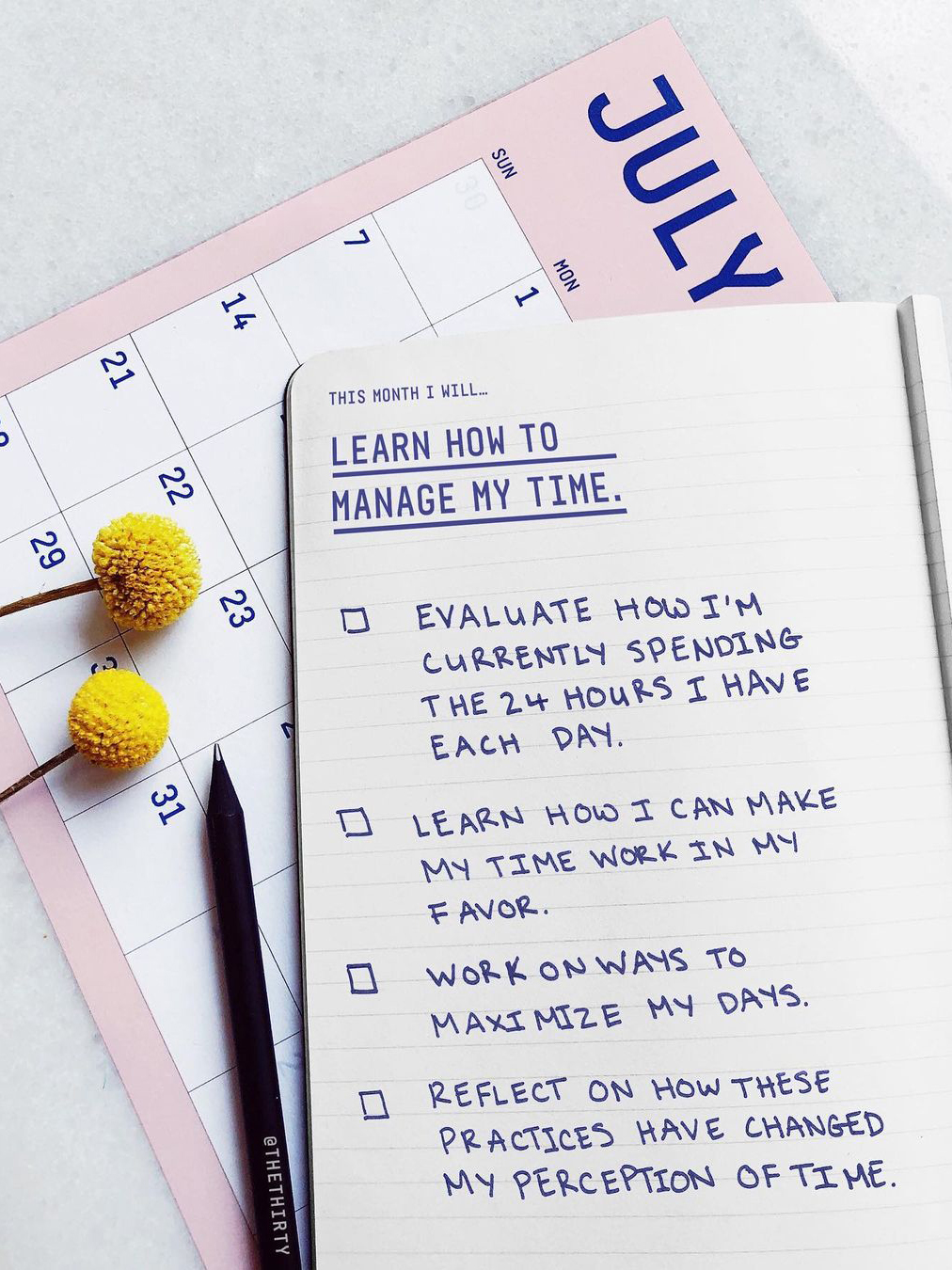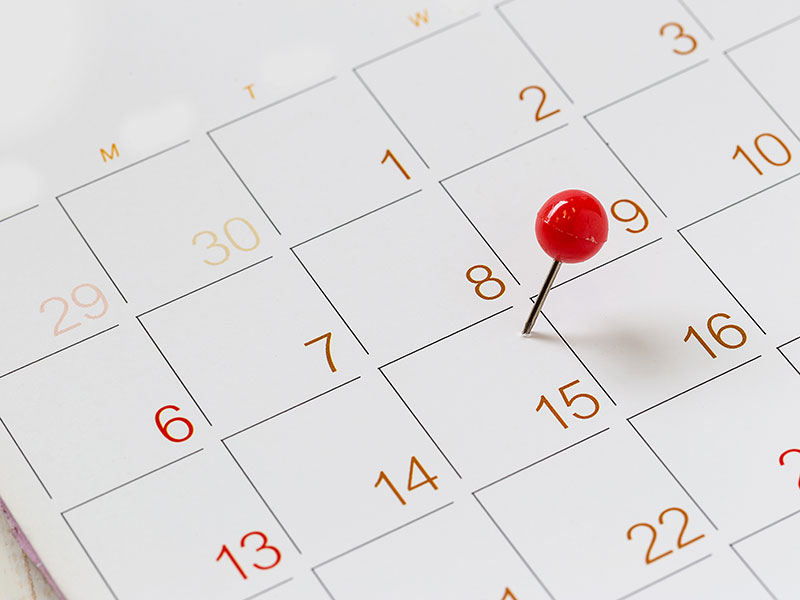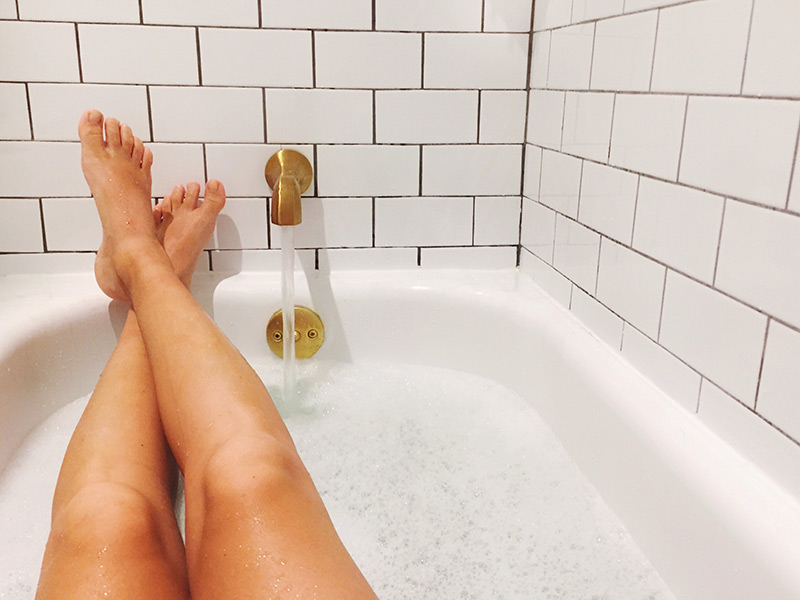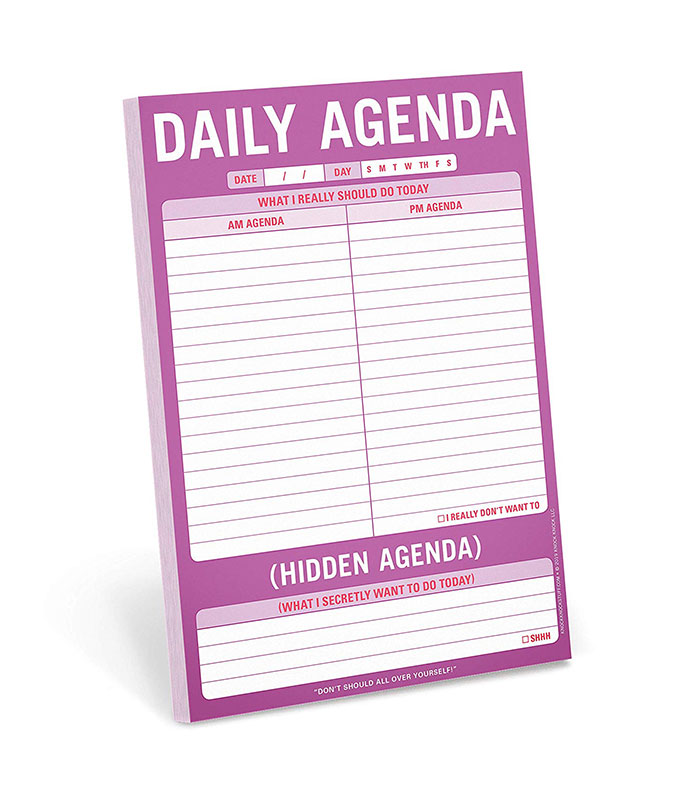It's Time to Stop Feeling Guilty About Not Getting Everything Done

The pressure is real—to excel at work, maintain perfect relationships, have an Instagram-worthy wardrobe, "perfect" skin, take up interesting hobbies or side hustles… I mean, the list can go on and on. In my opinion (and I think a lot of you will agree), technology has been great for connecting us to others and a whole treasure trove of information and ideas, but it's also made life a lot more stressful. I'm not a Luddite or anything (I write for a website for a living!), but technology has made the idea of "having it all" or "doing it all" a quasi mandate.
That stress can really get to you. In 2019, the World Health Organization classified burnout as an "occupational phenomenon." How many times have you felt terrible about not crossing off every single thing on your to-do list in one day? Sometimes (most of the time?) it's physically and mentally impossible to get everything done. Still, a lot of us carry this intense guilt.

Now, I'm not saying that you should slack off and do very little. Where would we be in the world without our #bossladies (insert favorite word for successful and powerful females here)? You should strive for success and reach for those lofty goals, but not at the expense of your health, both mind and body. It just takes knowing your own personal limits and shaking off that guilt.
As someone who has been an extreme worrier since birth and whose Enneagram type is Three: The Achiever, saying goodbye to said guilt is easier said than done—but possible. I talked to experts about how to combat these feelings and how to come to terms with it in a way that's healthy for your mind, body, and lifestyle. Here's what they had to say.
Stop With the Comparisons

It's so easy to look at Instagram and then look at your life with disdain. That might be a dramatic way to put it, but it's true. How many times have you looked at someone's feed and thought, "I wish my life were like that"? But the truth is, what's on Instagram took 100 tries to get the perfect shot, and most of the time, it's not an accurate representation of real life.
"Comparison often causes us to focus more on what we're not doing or what we don't have instead of recognizing the positive things we are accomplishing," says Madeleine DiLeonardo, M.Ed, LPC, NCC, a licensed professional counselor and founder of Mind, Body, and Soul by DiLeonardo Wellness. "If we instead view social media as a highlight reel rather than comparing other people's best days to our more challenging ones, that often allows for more perspective."

The same goes for life off the 'gram. "Everyone's journey and purpose are unique. Yes, maybe your co-worker got her project done sooner, or your friend made her kids a better dinner, but you're doing the best you can. Or at least trying to," says Sheina Schochet, LMHC, a licensed therapist, relationship coach, and professor. "And that is what matters. Be honest with yourself—if you could be doing more without spreading yourself too thin, then up the ante. But if you're at a good place for you—accomplishing things at a pace that is just challenging enough—then that is your path, and no need to apologize for it."
Check Your Expectations

A lot of us are trained to say "yes" to just about everything. You want to look like you're an overachiever or team player, so you're "more than happy" to take on that extra project or that task off of your manager's plate. But if you overcommit, you could be setting yourself up for failure.
"Look at whether you are putting more on your plate than you can realistically handle. Yes, we want to be able to do all the things, but we are human," says Schochet. "Be kind to yourself. It is great to work hard at times, but if you do that all the time, you'll burn out. Be in tune to you and what you can handle."
Prioritize

This not only keeps the guilt away but helps with productivity in general. "Be mindful of what you need to accomplish and what feels most important to you," says Amy Cirbus, PhD, a licensed professional counselor and Talkspace's manager of clinical quality. "Everything doesn't hold the same weight. Push the things down the list that can wait because the other thing to remember is that tomorrow is another day. There's no prize at getting through an impossibly long list when it leaves you depleted. There's a quality aspect that can easily get lost in the rush of trying to do it all."
And don't feel bad about saying no. "I see a lot of women trying to fit in every single thing and often leaving no room for themselves or the things that they truly want or need to do," says DiLeonardo. "Taking stock of priorities and then being unapologetic about them is empowering. I think it's okay to turn down a co-worker's birthday happy hour or a request to hang out if you have identified your priorities need to lie elsewhere that week."
Think About the Journey

It might sound corny to say life's a journey, but it really is! "Realize that it's more about the journey than the end result. Study after study (and life experience) has shown that when we reach goals, we're not as happy/satisfied as we thought we would be," says Schochet. "The joy isn't in reaching the end. It's about being involved in something that is meaningful to you, that you are passionate about, and that gives you some level of pleasure. Look at how you're spending your time. Are you working on things that matter to you? Yes? Then great!"
Don't Take It Personally

The world is not out to get you, even though it might seem like that sometimes. "Try taking the personal aspect out of it. Not getting everything done is a function of the mechanics of a day and of life in general," says Cirbus. "We can get better at tackling guilt when our self-worth isn't tied up with what we can get done in a day. Who we are is very different than what we do. Take a look at what you're paying attention to and how you're doing it. There's tremendous value to the quality of your time. This must get added into any checked boxes of your daily task list. Ask yourself, what did you accomplish that felt like an investment in the things you value most?"
Reframe Your Thoughts

"Try reframing the thoughts around 'I have so much to do' with 'I get to do this,'" says DiLeonardo. "For example, instead of viewing the gym or errands as another thing on your endless to-do list, try focusing on the fact that you get to move your body to feel good, you are fortunate to be able to organize things in your home in a way that feels productive, and you are blessed to have relationships with people that you want to get together with for dinner." This thinking can make your responsibilities much more enjoyable.
Be Present

This can help make things feel less overwhelming. "In addition, being present-focused, meaning focusing on only what's in front of you, is essential," says DiLeonardo. "If your mind is racing with anxiety or guilt about all of the other things you need to do or didn't do, you're not appreciating the time that you do have in that moment. Some ways of maintaining awareness of this are grounding techniques, meaning focusing on what's in front of you by taking stock of what you can see, hear, touch around you in order to bring yourself back into the moment."
Take Care of Yourself

It's hard to check in on yourself when you're doing a million different things at a time—and that can lead to you neglecting your mental and physical health. You might have had those days where you've forgotten to eat lunch or you're running on four hours of sleep because you stayed up late to finish a project.
"Managing yourself is managing your time. Taking care of yourself ensures that you're going to be fully present to those things that you're trying to accomplish," says Cirbus. "It means you'll be using your time wisely. If you're feeling well-fed, well-rested, and balanced overall, you're going to feel the impact of the things that you're doing. Practice being mindful in your tasks rather than rushed. Busy doesn't mean productive. Busy just means busy, and we don't want to wear that as a badge of honor. Take breaks. Reassess your day as you go along. Pay attention to what's going on internally just as equally as you pay attention to what you're getting done. Stop when you need to."
Focus on What You Have Done

The way to be kinder to yourself and remove the guilt is to congratulate yourself for the things you've completed already. DiLeonardo suggests a therapy term called a cognitive reframe, which is focusing on what you did accomplish rather than thinking about the things you didn't do. "Here's an easy tool to incorporate this: At the end of every day, make it a point to think of three to five things that you're proud you accomplished. The key is to not expect to always have major 'wins' that you're proud of accomplishing but instead giving yourself more credit for the smaller ones: making a nutritious meal, reaching out to a friend, handling a challenging meeting, or sometimes even just getting to work and getting through the day are some examples. Doing this consistently creates a habit of focusing more on the positive and giving yourself credit for all you do accomplish in a day."
And cut yourself some slack, too. It's hard to go easier on yourself when you're so used to pushing yourself hard, but if you can focus on your own accomplishments, you can start making that line of thinking a healthy habit.
"Challenge the guilt and feeling 'less than.' The multitude of tasks you accomplish and roles you fill doesn't determine your worth. You are more than those. You are human, and we all need to rest at times," says Schochet. "And tune in to the amazing things you do like no one else, whether that's comforting a friend who is in a bad spot, being there for a family member, the way you can get a whole room to smile, or really taking care of your health so you can be your best you."
Recognize Every Day/Week/Month Is Different

When you're in the thick of it, it's hard to get some distance and remember that some times are busier than others, and some parts of your life require more focus at times, whether it's your family at one point or your career at another point.
"Mallika Chopra has a Balance Wheel that I really love. There are seven sections: sense of purpose, rest and sleep, good nutrition and exercise, relationships (family, friends, community), work/financial/career, intellectual stimulation, creativity and play," says DiLeonardo. "Each week it helps to be reflective without judgment to determine what aspects of our Balance Wheels feel like they're struggling, what aspects feel like they're thriving, and work to make small adjustments with our time based on viewing our lives overall."
Find Some Time for R&R

This goes hand in hand with taking care of yourself. You've got to recharge in order to be the most productive. So set aside some time at the end of the day for that bath or favorite workout. "There also tends to be a major focus on 'doing it all,' and this negates the importance of giving ourselves space for rest and rejuvenation. It's important to relax, give yourself some grace, and recognize the days where you need to nurture yourself rather than push to get it all done!" says DiLeonardo.
Along with your "me" time, make sure you pencil in your friends and family, too. This might help shift your perspective. "Life is unpredictable, and we never know what tomorrow will bring. Make sure to schedule in the things that matter to you—whether that is Sunday brunch with your family, bedtime with your kids, drinks with friends, hiking, traveling, cooking, etc.," says Schochet. "When you get to the point in your life where you feel you're running out of time, you won't be congratulating yourself on all the tasks you crossed off your to-do list. You'll be thinking back on the memories you created and the times you shared with people you care about. [Those are] priceless."

Incorporate these tips into your thinking and lifestyle if you want to take some of the pressure off. Remember: Self-improvement always takes time, and you've got to be kind to yourself.
Next up: How to Access Affordable Therapy in 5 Simple Steps
This article was originally published at an earlier date and has since been updated.
This article is provided for informational purposes only and is not intended to be used in the place of advice of your physician or other medical professionals. You should always consult with your doctor or healthcare provider first with any health-related questions.
Sarah is lifestyle writer and editor with over 10 years of experience covering health and wellness, interior design, food, beauty, and tech. Born and raised in Los Angeles, she attended New York University and lived in New York for 12 years before returning to L.A. in 2019. In addition to her work atBest Knockoff Luxury Clothing , she held editor roles at Apartment Therapy, Real Simple, House Beautiful, Elle Decor, and The Bump (sister site of The Knot). She has a passion for health and wellness, but she especially loves writing about mental health. Her self-care routine consists of five things: a good workout, “me” time on the regular, an intriguing book/podcast/playlist to unwind after a long day, naps, and decorating her home.
